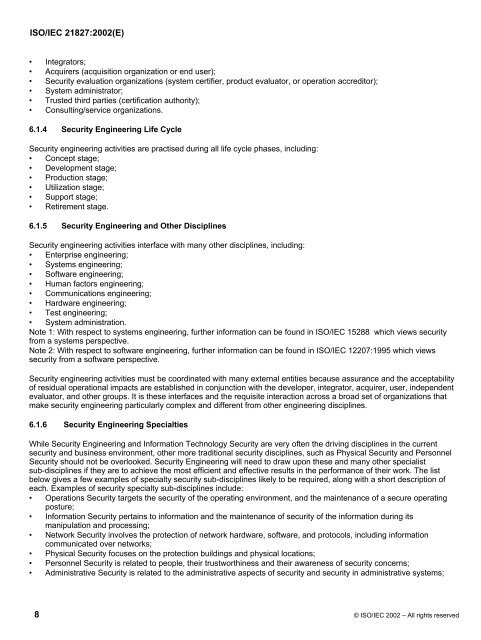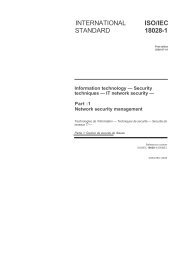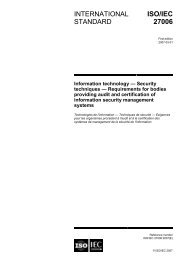ISO/IEC 21827
ISO/IEC 21827
ISO/IEC 21827
Create successful ePaper yourself
Turn your PDF publications into a flip-book with our unique Google optimized e-Paper software.
<strong>ISO</strong>/<strong>IEC</strong> <strong>21827</strong>:2002(E)<br />
• Integrators;<br />
• Acquirers (acquisition organization or end user);<br />
• Security evaluation organizations (system certifier, product evaluator, or operation accreditor);<br />
• System administrator;<br />
• Trusted third parties (certification authority);<br />
• Consulting/service organizations.<br />
6.1.4 Security Engineering Life Cycle<br />
Security engineering activities are practised during all life cycle phases, including:<br />
• Concept stage;<br />
• Development stage;<br />
• Production stage;<br />
• Utilization stage;<br />
• Support stage;<br />
• Retirement stage.<br />
6.1.5 Security Engineering and Other Disciplines<br />
Security engineering activities interface with many other disciplines, including:<br />
• Enterprise engineering;<br />
• Systems engineering;<br />
• Software engineering;<br />
• Human factors engineering;<br />
• Communications engineering;<br />
• Hardware engineering;<br />
• Test engineering;<br />
• System administration.<br />
Note 1: With respect to systems engineering, further information can be found in <strong>ISO</strong>/<strong>IEC</strong> 15288 which views security<br />
from a systems perspective.<br />
Note 2: With respect to software engineering, further information can be found in <strong>ISO</strong>/<strong>IEC</strong> 12207:1995 which views<br />
security from a software perspective.<br />
Security engineering activities must be coordinated with many external entities because assurance and the acceptability<br />
of residual operational impacts are established in conjunction with the developer, integrator, acquirer, user, independent<br />
evaluator, and other groups. It is these interfaces and the requisite interaction across a broad set of organizations that<br />
make security engineering particularly complex and different from other engineering disciplines.<br />
6.1.6 Security Engineering Specialties<br />
While Security Engineering and Information Technology Security are very often the driving disciplines in the current<br />
security and business environment, other more traditional security disciplines, such as Physical Security and Personnel<br />
Security should not be overlooked. Security Engineering will need to draw upon these and many other specialist<br />
sub-disciplines if they are to achieve the most efficient and effective results in the performance of their work. The list<br />
below gives a few examples of specialty security sub-disciplines likely to be required, along with a short description of<br />
each. Examples of security specialty sub-disciplines include:<br />
• Operations Security targets the security of the operating environment, and the maintenance of a secure operating<br />
posture;<br />
• Information Security pertains to information and the maintenance of security of the information during its<br />
manipulation and processing;<br />
• Network Security involves the protection of network hardware, software, and protocols, including information<br />
communicated over networks;<br />
• Physical Security focuses on the protection buildings and physical locations;<br />
• Personnel Security is related to people, their trustworthiness and their awareness of security concerns;<br />
• Administrative Security is related to the administrative aspects of security and security in administrative systems;<br />
8 © <strong>ISO</strong>/<strong>IEC</strong> 2002 – All rights reserved
















